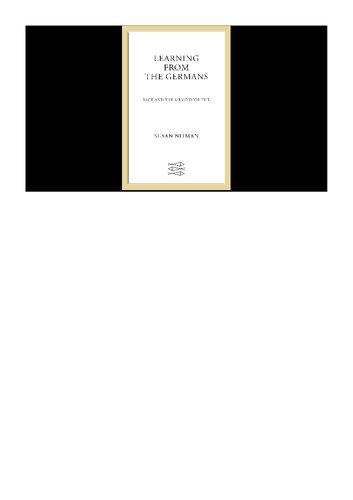
Learning from the Germans
Race and the Memory of Evil
کتاب های مرتبط
- اطلاعات
- نقد و بررسی
- دیدگاه کاربران
نقد و بررسی

June 1, 2019
A pointed demonstration of how Germany offers lessons for attending to polarizing issues of the past and present. "It cannot be too much to expect the U.S. Congress to do in the twenty-first century what the German parliament did in 1952," writes Einstein Forum director Neiman (Why Grow Up? Subversive Thoughts for an Infantile Age, 2015, etc.), in favor of legislation that would create a commission to investigate the possibility of reparations for the pains suffered by African Americans under slavery and by other populations, such as Native Americans in the way of so-called Manifest Destiny. In recognizing the necessity of making real amends for the crimes of the Third Reich, Germany has paid just such reparations in many ways--even though, as the author notes, most Germans opposed such payments in the years immediately following World War II, just as it seems that most white Americans oppose reparations today. The issues extend: Germany bans expressions in support of Nazism even though extreme right-wingers have been recently emboldened by the widespread controversy over immigration, another topic familiar to Americans today. Even with such outbursts, Germany holds a lead over the U.S. in dealing with errors of the past. Where the wartime generation tried to brush aside the legacy of Nazism, the present one exemplifies "how far Germany has come in taking responsibility for its criminal history." While direct equations between, say, the American secessionists and the Nazis are problematic, there are plenty of points in common. Interestingly, it took the unification of Germany to arrive at full acknowledgment of past wrongs: The East took one view, the West another, each accusing the other of complicity. Today, Neiman writes, quoting a German scholar, "Germany is one of the safest countries for Jews in the world." Neiman's account is long and at times plodding, but her examination of how that situation came about serves as an important lesson for those who seek to face up to the past wrongs in this country. A timely, urgent call to revisit the past with an eye to correction and remedy.
COPYRIGHT(2019) Kirkus Reviews, ALL RIGHTS RESERVED.

July 26, 2019
Central to understanding this latest book from Neiman (director, Einstein Forum; Why Grow Up? Subversive Thoughts for an Infantile Age) is analyzing history and historical memory. The author closely looks at how East and West Germany have confronted their participation with the past. The road to this new-found awareness has not been smooth. Philosopher Neiman, who currently resides in Berlin, is a Jewish woman born and raised in the American South. With this work, she presents a different perspective on how Germany has acknowledged its Nazi past and suggests the same could possibly be done in the United States. Neiman visits Mississippi, Georgia, and other states to examine what slavery, the U.S. Civil War, and the legacy of Jim Crow wrought on the American people. In doing so, the author discusses ways in which these conversations raise awareness of the dangers of not confronting the past. VERDICT A fascinating book that assists readers in gaining a deeper understanding of the past in order to move forward. Highly recommended for all history readers and teachers. [See Prepub Alert, 2/4/19.]--Amy Lewontin, Northeastern Univ. Lib., Boston
Copyright 2019 Library Journal, LLC Used with permission.

July 26, 2019
Author of the distinguished Evil in Modern Thought, a white woman raised in the civil rights-era South, and a Jewish woman who's lived many years in Berlin, Neiman considers what Americans facing white nationalist violence can learn from Germany's efforts to grapple with the Holocaust.
Copyright 2019 Library Journal, LLC Used with permission.

























دیدگاه کاربران